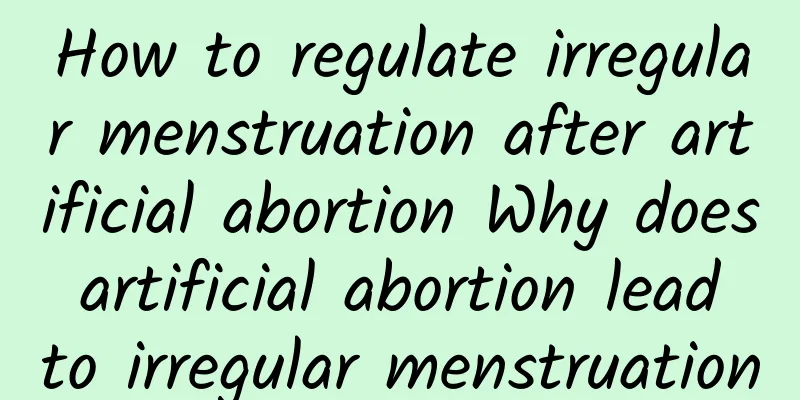How to regulate irregular menstruation after artificial abortion Why does artificial abortion lead to irregular menstruation

|
1. Causes of irregular menstruation after artificial abortion Having sex and taking a bath too early after surgery. Some women have sex with their husbands a few days after surgery, or take a bath without following the doctor's advice, which causes bacteria to invade the vagina and uterus, resulting in uterine cavity infection, irregular menstruation and amenorrhea. Excessive mental tension and anxiety. Fear before surgery, fear of abortion or mental burden caused by inability to get pregnant, especially feeling ashamed of getting pregnant before marriage. If this emotion fails to change after surgery, it may lead to amenorrhea. Individual differences. Everyone's body is different. Some women's endocrine system changes after artificial abortion, and the level of chorionic gonadotropin drops suddenly, which makes the ovaries unable to respond to the gonadotropin from the anterior pituitary gland for a while, resulting in the endometrium not changing according to the cycle and amenorrhea. Frequent artificial abortions. Some women have several abortions in a year, which causes the endometrium to be scraped thin and cannot be restored in a short period of time. If the basal layer of the endometrium is completely damaged, it can lead to permanent amenorrhea, while partial damage can cause temporary amenorrhea. 2. Postoperative precautions After an abortion, you should rest in bed for 2-3 days. You can get out of bed and move around later, gradually increasing the time spent on activity and watching less newspapers and TV. Within 2 weeks after the operation, you should rest in bed appropriately. Do not engage in heavy physical labor within half a month after the abortion and avoid contact with cold water. Eat more nutritious food to restore your body to normal as soon as possible. Keep the vulva clean and hygienic, change sanitary napkins frequently 1 to 2 times a day. Do not take a sitz bath within 2 weeks or before vaginal bleeding has stopped. The cervix has not closed after abortion, and the endometrium also has a process of repair. During this period, special attention should be paid to keeping the vulva clean and hygienic. Do not take a tub bath within half a month after surgery to prevent unclean water from entering the vagina, leading to bacterial invasion and infection. Avoid sexual intercourse within one month to prevent genital infection. If you have fever, abdominal pain, or vaginal discharge with an unusual odor, seek medical attention immediately. Generally, vaginal bleeding stops gradually in 3 to 5 days and lasts no longer than 10 to 15 days. If the amount of vaginal bleeding exceeds the amount of menstrual blood and lasts for too long, you need to seek medical treatment in time. |
>>: How to regulate irregular menstruation for women? Is irregular menstruation harmful to women?
Recommend
What are the routine examination items for cervical precancerous lesions?
Cervical precancerous lesions are a common diseas...
Can’t I be hospitalized for ectopic pregnancy?
Can’t I be hospitalized for ectopic pregnancy? 1....
Experts explain what you need to pay attention to after painless abortion
Painless abortion means that women will hardly fe...
Will vulvar leukoplakia develop into vulvar cancer?
Short story: Ms. Lin suffers from vulvar leukopla...
Rose flower drinking or external application can effectively relieve dysmenorrhea
Dysmenorrhea causes trouble to many women. Abdomi...
Is Guizhi Fuling Pill good for treating ovarian cysts? What are the symptoms of patients?
Is Guizhi Fuling Wan good for treating ovarian cy...
How to treat uterine fibroids in women
Uterine fibroids are common benign tumors in clin...
Why do you feel back pain when you wake up in the morning? Don’t ignore it
Although back pain may seem like a minor problem,...
Potassium permanganate sitz bath helps treat vaginitis
Vaginitis is a common gynecological disease. Some...
Drink juice? Dong's: Fruit-flavored drinks are a "big scam"
Many people believe that fruit juice is healthier...
Drug treatment of endometrial tuberculosis
Endometrial tuberculosis often follows pulmonary ...
Let’s find out together, what is high prolactin?
High prolactin is also called hyperprolactinemia,...
The relationship between pelvic inflammatory disease and dysmenorrhea
Pelvic inflammatory disease is a common gynecolog...
Choose rice wisely to avoid aflatoxin contamination
The Taiwanese population mainly relies on rice as...
The most common precautions after abortion
Abortion is widely used in life. Many people have...









